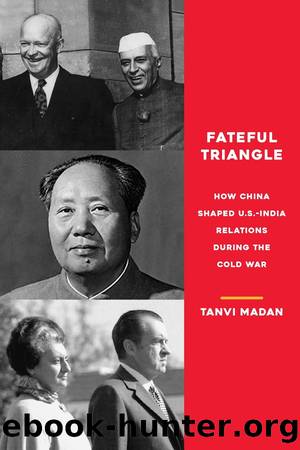Fateful Triangle by Tanvi Madan

Author:Tanvi Madan
Language: eng
Format: epub
Publisher: Brookings Institution Press
Losing Interest
The US, on its part, was watching India less and less. For Johnson, whose focus remained on Vietnam, India was not being helpful and thus was becoming less critical for the US. Furthermore, by summer/autumn 1967, the country looked like it would at least not fall. Thus, over the last year or so of his administration, India slipped down the priority list. Disillusionment started leading to disinterest and disengagement.
With congressional approval and a World Bank assessment that India was keeping up its end of the bargain on reforms, the administration agreed to multilateral economic and food assistance plans in spring 1967.165 But as Johnson considered Rostow’s recommendation for additional food aid in August, his desire for disengagement was evident. He called for “someone to argue the other side please.”166 He subsequently asserted that “it would appeal to him if some other nation would recognize their responsibilities in this nation, even the Russians.”167 By summer 1968, Congress would be appropriating fewer funds for India than it had for about a decade.168
There were other signs of the American desire to disengage more generally. The administration outlined a new South Asia military supply policy, which restarted a program to train some Indian and Pakistani officers, allowed limited credit sales, and opened up on a case-by-case basis the sales of spare parts for US-supplied equipment. Washington would also finish funding the radar system on the Sino-Indian border, because it directly “contribute[d] to US security interests.” But it would withdraw the US military advisory groups in India and Pakistan, cease sales of lethal equipment, and require approval of third-country sales of equipment covered by US controls. Overall, Rusk said, “We are in fact reverting to a military relationship with both countries similar to the one we had in the fifties with India (when it was on friendly terms with Communist China and the Soviet Union).”169
The administration also disengaged from efforts to improve India-Pakistan relations, despite continuing to believe that this could help Delhi alleviate the “more immediate threat of military pressure from China.” After trying earlier in 1967 to get India and Pakistan to reach an arms limitation agreement, the State Department concluded, “We cannot bring about reconciliation no matter how hard we try.” Rather, it was best to focus on strengthening relations with each country. From Washington’s perspective, maintaining a relationship with Pakistan did not exacerbate India’s China problem, as Delhi believed, but helped limit it. The administration wanted Delhi to recognize that it was in neither American nor Indian interests for the US to cede the ground in Pakistan entirely to China.170
American disengagement was facilitated by the US belief by summer 1967 that Indian defense preparations were sufficient. An intelligence assessment noted that India was not just likely to be able to win any war with Pakistan, but that it “could also probably repel a Chinese attack before it could reach the Indian plains. We believe that India’s armed forces would be able to prevent a major breakthrough by combined Chinese-Pakistani forces
Download
This site does not store any files on its server. We only index and link to content provided by other sites. Please contact the content providers to delete copyright contents if any and email us, we'll remove relevant links or contents immediately.
| Arms Control | Diplomacy |
| Security | Trades & Tariffs |
| Treaties | African |
| Asian | Australian & Oceanian |
| Canadian | Caribbean & Latin American |
| European | Middle Eastern |
| Russian & Former Soviet Union |
The Secret History by Donna Tartt(17823)
The Social Justice Warrior Handbook by Lisa De Pasquale(11798)
Thirteen Reasons Why by Jay Asher(8262)
This Is How You Lose Her by Junot Diaz(6255)
Weapons of Math Destruction by Cathy O'Neil(5595)
Zero to One by Peter Thiel(5293)
Beartown by Fredrik Backman(5107)
The Myth of the Strong Leader by Archie Brown(5078)
The Fire Next Time by James Baldwin(4802)
How Democracies Die by Steven Levitsky & Daniel Ziblatt(4794)
Promise Me, Dad by Joe Biden(4750)
Stone's Rules by Roger Stone(4685)
100 Deadly Skills by Clint Emerson(4502)
Rise and Kill First by Ronen Bergman(4377)
A Higher Loyalty: Truth, Lies, and Leadership by James Comey(4349)
The David Icke Guide to the Global Conspiracy (and how to end it) by David Icke(4235)
Secrecy World by Jake Bernstein(4181)
The Farm by Tom Rob Smith(4175)
The Doomsday Machine by Daniel Ellsberg(4078)
